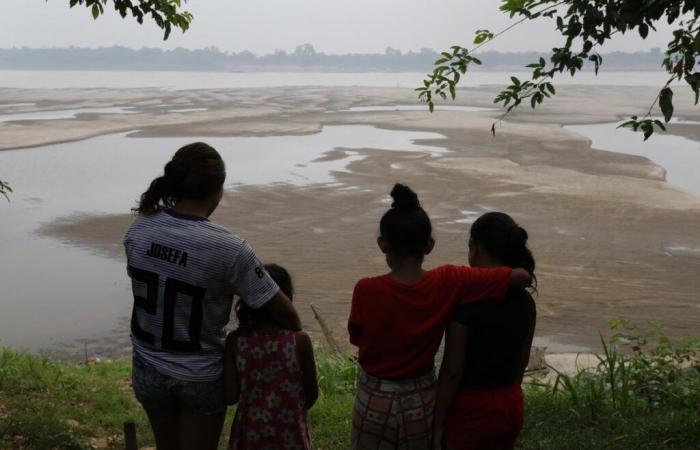The year 2024 has been brutal for the Amazon rainforest, with wildfires and extreme drought ravaging large parts of a biome that serves as a critical counterbalance to climate change.
Global warming fueled drought, which in turn fueled the worst year for fires since 2005. And those fires contributed to deforestation, with authorities suspecting some fires were set to facilitate land clearing in order to graze livestock there.
The Amazon is twice the size of India and spans eight countries and one territory, storing vast amounts of carbon dioxide that would otherwise warm the planet. It is home to around 20% of the planet's fresh water and astonishing biodiversity, including 16,000 known tree species.
However, governments have historically viewed it as an area to be exploited, with little regard for sustainability or the rights of its indigenous peoples, and experts say private exploitation and organized crime are increasing at an alarming rate.
“The fires and drought that hit the Amazon rainforest in 2024 could be worrying indicators of the much-feared ecological tipping point,” said Andrew Miller, director of advocacy at Amazon Watch, an organization that works to protect the tropical forest. “The window of opportunity for humanity to reverse this trend is narrowing, but remains open.”
There were some positives. The level of Amazon rainforest loss has decreased in Brazil and Colombia. And nations gathered for the annual UN biodiversity conference agreed to give indigenous people more say in decisions about nature conservation.
“If the Amazon rainforest is to avoid the tipping point, indigenous peoples will have been a determining factor,” Miller said.
The role of organized crime
Forest loss in the Brazilian Amazon, home to most of this rainforest, fell 30.6% from the previous year, the lowest level of destruction in nine years.
The improvement under left-wing President Luiz Inácio Lula da Silva contrasts with deforestation which reached its highest level in 15 years under his predecessor, far-right leader Jair Bolsonaro, who prioritized the expansion of agroindustry to the detriment of forest protection and which has weakened environmental agencies.
In July, Colombia reported historically low levels of deforestation in 2023, due to a decline in environmental destruction. The country's environment minister, Susana Muhamad, warned that the 2024 figures may not be as promising, as a significant increase in deforestation had already been recorded in July due to dry weather caused by El Niño, a meteorological phenomenon that warms the central Pacific. Illegal economies continue to fuel deforestation in the Andean country.
“It is impossible to ignore the threat that organized crime and the economies it controls represent to the conservation of the Amazon,” argued Bram Ebus, consultant for the Crisis Group organization in Latin America. “Illegal gold mining is growing rapidly, driven by soaring global prices, and revenues from illicit economies often exceed public budgets allocated to combating these activities.”
In Brazil, large swaths of the rainforest were covered in smoke in August from fires raging in the Amazon, the Brazilian Cerrado savannah, the Pantanal wetland and the state of Sao Paulo. Fires are traditionally used for deforestation and grazing management, and these human-caused fires have been largely responsible for starting wildfires.
Forest fires and extreme drought
For the second year in a row, the level of the Amazon River has reached desperately low levels, leading some countries to declare a state of emergency and distribute food and water to struggling residents. The situation was particularly critical in Brazil, where one of the main tributaries of the Amazon River reached its lowest level on record.
Cesar Ipenza, an environmental lawyer living in the heart of the Peruvian Amazon, believes that people are increasingly aware of the fundamental role of the Amazon “for the survival of society as a whole.” But, like Mr. Miller, he worries about a “point of no return in the destruction of the Amazon.”
According to the nonprofit Rainforest Foundation US, this year was the worst year for fires in the Amazon since 2005. Between January and October, an area larger than the state of Iowa – about 15 .1 million hectares of the Brazilian Amazon – burned. Bolivia saw a record number of fires in the first ten months of the year.
“Wildfires have become a constant, especially during the summer months, and require special attention from authorities who do not know how to manage or respond to them,” Mr Ipenza said.
Venezuela, Colombia, Ecuador and Guyana have also seen an increase in fires this year.
Indigenous voices and rights have advanced in 2024
The UN biodiversity conference – known this year as COP16 – was hosted by Colombia. The meetings put the Amazon in the spotlight and a historic agreement was reached to give indigenous groups a greater voice in nature conservation decisions, a development that builds on a growing movement to recognize the role of indigenous peoples in the protection of lands and the fight against climate change.
MM. Both Ebus and Miller saw a promising sign in the appointment of Martin von Hildebrand as secretary general of the Amazon Cooperation Treaty Organization, announced at COP16.
“As an expert on Amazonian communities, he will need to rally governments for joint conservation efforts. If the political will is there, international donors will mobilize to finance new strategies aimed at protecting the largest tropical forest in the world,” said Mr. Ebus.
Mr. Ebus said Amazon countries need to cooperate more, whether in law enforcement, deploying joint emergency teams to fight wildfires or providing health care in the remote border areas of the Amazon. However, they need help from the rest of the world, he said.
“The well-being of the Amazon is a shared global responsibility, as consumer demand around the world fuels trade in raw materials that finance violence and environmental destruction,” he said.
Next year will mark a critical moment for the Amazon, as the municipality of Belém in northern Brazil will host the region's first UN COP that will focus on climate.
“The leaders of Amazonian countries have the opportunity to present their strategies and demand tangible support,” said Ebus.
___
Associated Press coverage of climate and environmental issues receives financial support from several private foundations. The AP is solely responsible for all content.





